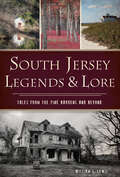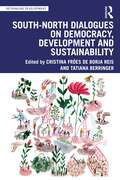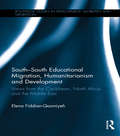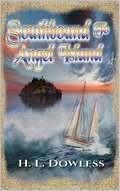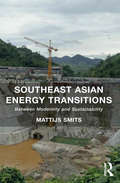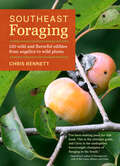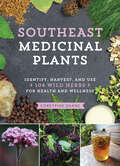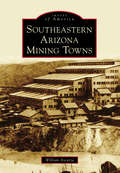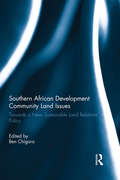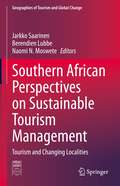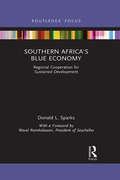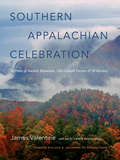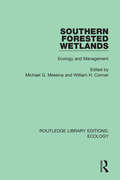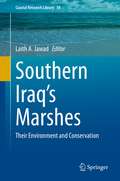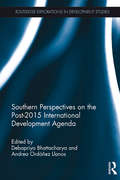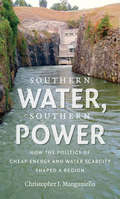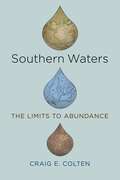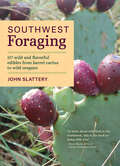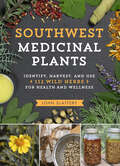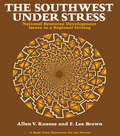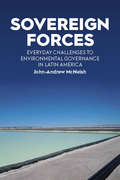- Table View
- List View
The South China Sea
by Jenner, C. J. and Thuy, Tran Truong C. J. Jenner Tran Truong ThuyOver the last few decades there has been growing recognition of the importance of a peaceful and stable South China Sea for Indo-Pacific security and development, a recognition that has been underlain, paradoxically, by the increasingly precarious situation in this body of water that straddles critical shipping lanes from the Indian to the Pacific Ocean. This book informs its readership of the most recent developments in the South China Sea with insightful and prescient analyses from both legal and international relations perspectives. It delves into the policy perspectives and deliberations of the various relevant regional and extra-regional actors in the South China Sea dispute, the exercise of international law in the context of the changing regional political landscape, and the promise and pitfalls of past, current, and potential initiatives to manage and settle the dispute. Written by some of the most well-known scholars and knowledgeable insiders in the fields South China Sea studies, the collection offers a wide array of diverse views that should help enrich the ongoing global discussion on conflict management and resolution in the South China Sea.
South Jersey Legends & Lore: Tales from the Pine Barrens and Beyond (American Legends)
by William J. LewisFrom Piney Folklore to Legendary Figures of South Jersey's Past Author William Lewis presents fascinating tales, revealing legends and beloved lore from the heart of Southern New Jersey.
South-North Dialogues on Democracy, Development and Sustainability (Rethinking Development)
by Cristina Fróes de Borja Reis Tatiana BerringerThis book shows how bringing together experts from the Global South and the Global North can help us to understand and combat global economic, political, and social inequalities. For too long, the world’s problems have been viewed through the narrow conceptual lenses of the Global North. This book lays the groundwork for a new approach – a truly global approach to political economy. We are currently facing multiple and overlapping international crises. The current economic crisis, characterized by deepening inequalities, is closely intertwined with intensifying geopolitical rivalries and the environmental crisis. The dialogues in this book aim to move beyond the Eurocentric tradition and bring voices from the Global South to the forefront of the debate. Covering 11 key themes drawn from the United Nations’ Agenda 2030, the book conceptualizes democracy, development, and sustainability not only as strategies, but also as values that are integrated into the same – and continuously changing – analytical process. This book will be of great interest to students, researchers, and experts in international relations, global development, and international political economy, and to anyone looking for new perspectives on pernicious problems.
South Solo: Kayaking to Save the Albatross
by Hayley ShephardAn Antarctic adventure of solo kayaking--an inspirational and wondrous real-life story. A record of an intrepid woman's solo kayaking expedition around the South Georgia Island, Antarctica, to raise awareness for the magnificent Albatross who are perishing by the thousands in the baited long lines of commercial ocean fishing. Augmented with forty-five glorious photographs that capture the sheer beauty and dangers of Antarctica. "You have seen the albatross in full flight like few have witnessed, with salt in your teeth . . . I cannot think of a better spokesperson for all things wild, because, you Hayley, in your own intimate way, have flown with the Albatross." --Brian Keating, noted Canadian naturalist, in the Foreword
South-South Educational Migration, Humanitarianism and Development: Views from the Caribbean, North Africa and the Middle East (Routledge Studies in Development, Mobilities and Migration)
by Elena Fiddian-QasmiyehThis ground-breaking book is one of the first to analyse the important phenomenon of South-South educational migration for refugees. It focuses particularly on South-South scholarship programmes in Cuba and Libya, which have granted free education to children, adolescents and young adults from two of the world’s most protracted refugee situations: Sahrawis and Palestinians. Through in-depth multi-sited fieldwork conducted with and about Sahrawi and Palestinian refugee students in Cuba and Libya, and following their return to the desert-based Sahrawi refugee camps in Algeria and the urban Palestinian refugee camps in Lebanon, this highly pertinent study brings refugees’ views and voices to the forefront and sheds a unique light on their understandings of self-sufficiency, humanitarianism and hospitality. It critically assesses the impact of diverse policies designed to maximise self-sufficiency and to reduce both brain drain and ongoing dependency upon Northern aid providers, exploring the extent to which South-South scholarship systems have challenged the power imbalances that typically characterise North to South development models. Finally, this very timely study discusses the impact of the Arab Spring on Libya’s support mechanisms for Sahrawi and Palestinian refugees, and considers the changing nature of Cuba’s educational model in light of major ongoing political, ideological and economic shifts in the island state, asking whether there is a future for such alternative programmes and initiatives. This book will be a valuable resource for students, researchers and practitioners in the areas of migration studies, refugee studies, comparative education, development and humanitarian studies, international relations, and regional studies (Latin America, Middle East, and North Africa).
Southbound to Angel Island
by H. L. Dowless<p>In this novel, a dangerous journey on stormy seas leads a man to an island where the past of the United States lives on.<p> <p>The America of the past was extraordinary. Today, unfortunately, it has descended into debauchery and chaos. The government has turned on its citizens and erected a political inquisition to replace legitimate rule of law based upon hard facts. Economic excellence for the masses is forbidden, contrary to the nation’s individualist past.<p> <p>A splendid, yet elusive, island lies in the southern seas where the America of the past still resides. For more than three-hundred years, individuals have longed for it, adventurers have died for it, and here we find those who have actually found it.<p> <p>Between the pages of this book, you will discover your place inside this wonderful land of glorious achievement . . .or will you?<p>
Southeast Asian Energy Transitions: Between Modernity and Sustainability
by Mattijs SmitsAddressing the apparent tensions between modernity and sustainability in Southeast Asia, this book offers novel insights into the global challenge of moving towards a low carbon energy system. With an original and accessible take on social theory related to energy transitions, modernity and sustainability, Mattijs Smits argues for a reinvigorated geography of energy. He also challenges universalistic and linear assumptions about energy transitions and makes the case for ’energy trajectories’, stressing embeddedness, contingency and connections between scales. Contemporary and historical empirical examples from Southeast Asia, primarily Thailand and Laos, are drawn upon to show the importance of scale at regional, national, local and household levels. The transitions in the national power sectors here have been intimately related to discourses of modernity and state formation since the colonial era. More recently, plans for international cooperation and discourses of regional power trade have taken centre stage. Local energy trajectories are understood to be part of these transitions, but also as embedded in local social, political and spatial relations. Examining how energy practices go hand-in-hand with the dissemination of different technologies, this work shows the complexities of achieving sustainability in the context of rapidly changing energy modernities in Southeast Asia.
Southeast Foraging: 120 Wild and Flavorful Edibles from Angelica to Wild Plums (Regional Foraging Series)
by Chris Bennett“This is the ultimate guide, and Chris is the undisputed heavyweight champion of foraging in the South.” —Sean Brock, author of Heritage and chef of McCradys, Minero, and Husk The Southeast offers a veritable feast for foragers, and with Chris Bennett as your trusted guide you will learn how to safely find and identify an abundance of delicious wild plants. The plant profiles in Southeast Foraging include clear, color photographs, identification tips, guidance on how to ethically harvest, and suggestions for eating and preserving. A handy seasonal planner details which plants are available during every season. Thorough, comprehensive, and safe, this is a must-have for foragers in Alabama, Arkansas, Florida, Georgia, Maryland, Kentucky, Louisiana, Mississippi, North Carolina, South Carolina, Tennessee, Virginia, and West Virginia.
Southeast Medicinal Plants: Identify, Harvest, and Use 106 Wild Herbs for Health and Wellness
by CoreyPine ShaneWildcraft Your Way to Wellness In Southeast Medicinal Plants, herbalist CoreyPine Shane is your trusted guide to finding, identifying, harvesting, and using 106 of the region&’s most powerful wild plants. Readers will learn how to safely and ethically forage, and how to use wild plants in herbal medicines, including teas, tinctures, and salves. Plant profiles include clear, color photographs, identification tips, medicinal uses and herbal preparations, and harvesting suggestions. Lists of what to forage for each season makes the guide useful year-round. Thorough, comprehensive, and safe, this is a must-have for foragers, naturalists, and herbalists in West Virginia, Virginia, Kentucky, Tennessee, North Carolina, South Carolina, Georgia, Florida, Alabama, Mississippi, Arkansas, and Louisiana.
Southeastern Arizona Mining Towns
by William AscarzaSoutheastern Arizona has one of the most diverse mining localities in the state. Towns such as Bisbee, Clifton, Globe, Miami, Ray, Silverbell, and Superior have earned reputations as premier metal producers that are most notably known for their copper. Other mining towns that have made their marks in the region include Dos Cabezas, Gleeson, Harshaw District, Helvetia, Patagonia District, Pearce, Ruby, and Tombstone. Mining in southeastern Arizona has significantly influenced the development of mines in northern Sonora, Mexico. The foundation of Mexico's largest copper mine in Cananea was financed by American capital, specifically under the direction of miners and investors from southeastern Arizona. Overall, the process of mining has established the economy of southeastern Arizona, making it a viable source of copper-related minerals in the 21st century's global market.
Southern African Development Community Land Issues: Towards a New Sustainable Land Relations Policy
by Ben ChigaraThis book constitutes volume one of a two volume examination of development community land issues in Southern Africa. In this volume, Ben Chigara undertakes a holistic inter-disciplinary evaluation of the legitimacy of colonial and emergent post-colonial rule property rights in affected States of the Southern African Development Community (SADC). It particularly focuses on intensifying litigation in national courts, the SADC Tribunal, and more recently the Washington based International Centre for the Settlement of Investment Disputes (ICSID) regarding counter claims to title to property. The book examines cultural, economic and political drivers at the core of SADC land issues, focusing on their significance and potential to contribute to the discovery of a new, sustainable land relations policy that guarantees social justice in the distribution of all the advantages and disadvantages relating to the allocation and use of land. Chigara shows that persistent systematic administrative failures by pre-colonial, colonial and post-colonial authorities have made for a very complex challenge that requires Solomonic tools that neither the Courts alone, nor human rights centric morality alone could resolutely attend. The book recommends a sophisticated systematic new approach to SADC land issues, which is developed in volume two, Re-conceiving Property Rights in the New Millennium. This book will be of great interest to students and researchers of Property and Conveyancing Law, Human Rights Law and Land Law.
Southern African Perspectives on Sustainable Tourism Management: Tourism and Changing Localities (Geographies of Tourism and Global Change)
by Jarkko Saarinen Berendien Lubbe Naomi N. MosweteThis edited collection focuses on tourism development, sustainability and local change in southern Africa. The book offers a range of both conceptual and applied perspectives that address various changes in southern African tourism and community development relations. The key drivers of change that include climate change and globalization form the context for the diverse and interesting set of case studies from the region. The main conceptual grounds of the book cover sustainability, sustainable development goals (SDGs), responsibility, vulnerability, adaptation, resilience, governance, local development and inclusive growth. In this book sustainability is seen as one of the most important issues currently facing the tourism sector, affecting all types and scales of tourism operations and environments in the region. Tourism is an increasingly important economy in the southern African region and the industry is creating changes for communities and environment while also facing major challenges caused by global trends and changes. The book offers a case study driven approach to sustainability needs of tourism development in local community contexts. The case study chapters are linked through the book’s focus on sustainable tourism and local community development. Through emphasizing the need to understand both global change and local contexts in sustainable tourism development, this book is a valuable resource for all those working in the field.
Southern Africa's Blue Economy: Regional Cooperation for Sustained Development (Europa Introduction to...)
by Donald L. SparksSouthern Africa’s maritime interests are considerable: its oceans and ports are essential to the wealth of the region, are crucial for trade and are an important source of employment, food and energy. However, regional governments do not place sufficient attention on the Blue Economy and its potential to stimulate economic growth. Of the 17 UN Sustainable Development Goals, goal Number 14 (Life Below Water) is the least funded. Less than 1% of Official Development Assistance goes toward this goal, and even private investment and funding from philanthropic organizations is grossly inadequate to meet Africa’s blue economy needs. It is vital for the international community to face up to the challenges of Africa’s Blue Economy and start working on solutions and for southern Africa’s Blue Economy policies and goals to be expanded. Just as sustainable development green initiatives show promise, so too could Blue Economy projects and activities. Southern Africa’s rich coastal and marine resources need to be managed on both a national and regional level if they are to be used in a long-term, sustainable way. This book provides, for the first time, a concise study of the constraints and opportunities that the Blue Economy offers for southern Africa and the role that the Southern African Development Community (SADC) could play in fostering a sustainable use of its ocean and coastal resources.
Southern Appalachian Celebration
by James ValentineWith this stunning collection of images of the Southern Appalachians, James Valentine presents an enduring portrait of the region's unique natural character. His compelling photographs of ancient mountains, old-growth forests, rare plants, and powerful waterways reveal the Appalachians' rich scenic beauty, while Chris Bolgiano's interpretive text and captions tell the story of its natural history. Over four decades, Valentine has hiked hundreds of miles across mountainous parts of Alabama, Georgia, South Carolina, North Carolina, Tennessee, Kentucky, Virginia, and West Virginia to photograph some of the last remnants of original forest. These scarce and scattered old-growth stands are the most biologically diverse temperate forests in the world. By sharing these remaining pristine wild places with us, Valentine and Bolgiano show that understanding these mountains and their extraordinary biodiversity is vital to maintaining the healthy environment that sustains all life. Featuring an introduction by the late, longtime conservationist Robert Zahner and a foreword by William Meadows, president of the Wilderness Society, this visually entrancing and verbally engaging book celebrates the vibrant life of Southern Appalachian forests.
Southern Forested Wetlands: Ecology and Management (Routledge Library Editions: Ecology #9)
by Michael G. Messina William H. ConnerOriginally published in 1998, Southern Forested Wetlands is an up to date, one source compendium of current knowledge on the wetland ecology of America’s southern forests. This book presents both the ecological and management aspects of these important ecosystems. The book was compiled by members of the Consortium for Research on southern forested wetlands, and was a collaboration of those working to conserve, study, and manage these economically and environmentally influential areas. The book covers geographic ranges from West Virginia to Florida, to Texas and inland north to Arkansas and Tennessee. It also addresses specific wetland types, including deep-water swamps, major and minor alluvial flood plains, pocosins and Carolina bays, mountain fens, pond cypress swamps, flatwoods wetlands, and mangroves.
Southern Iraq's Marshes: Their Environment and Conservation (Coastal Research Library #36)
by Laith A. JawadThe Mesopotamian marshes are important for economic, social, and biodiversity values and have been home to indigenous human communities for millennia. They are regarded as a legendary site. This multi-authored book contains chapters written by world-renowned experts in their field. Both basic and applied information are made available, making the book a must-have for a wide spectrum of users. For example, an understanding of the natural and the social aspects of the marshes, as described here, is an obvious prerequisite for a pest management plan in this area. Scholars interested in wetlands can use this book as a guide to compare different wetlands areas in Asia. The bibliography section contains valuable references to the marsh areas and research in the field. This book serves as an up-to-date comprehensive source of information on different aspects of the southern marshes of Iraq and is aimed at academic scholars, environmentalists, and decision makers.
Southern Living: 223 Ideas for Containers, Beds & Borders
by The Editors of Southern LivingIn honor of Southern Living's 50th anniversary, we present our best-ever collection of gardening ideas and advice, from growing information for top Southern plants to tours of the South's most beautiful gardens.
Southern Perspectives on the Post-2015 International Development Agenda (Routledge Explorations in Development Studies)
by Debapriya Bhattacharya Andrea Ordóñez LlanosAt the turn of the millennium, the unanimous adoption of the Millennium Development Goals (MDGs) by the United Nations General Assembly marked a new chapter in international development. However, voices from the Global South were noticeably absent in shaping the agenda. Fifteen years later, the global context has changed so much that it would have been inconceivable not to have taken voices from the South into account when planning the new Sustainable Development Goals (SDGs). Since its inception in 2012, the Southern Voice on Post-MDG International Development Goals (Southern Voice), a network of 48 think tanks from Africa, Asia and Latin America, has generated a substantial body of original research to feed into various aspects of the post-2015 development agenda, such as the missing dimensions of the MDGs, ways to mitigate existing challenges in delivering on aspired outcomes, and new issues, goals, targets and indicators that are crucial for the next global development framework. Southern Perspectives on the Post-2015 International Development Agenda consolidates this research and stitches together development realities and policy experiences from the Global South, infusing unique local perspectives to the global debate on the post-2015 agenda. The compendium addresses the overarching themes underpinning the new international development framework by focusing on issues such as sustainability and growth, inclusion and social policies, governance and capacities, and financing of the new agenda. Southern Voice seeks to challenge the "knowledge asymmetry" afflicting the global knowledge system by channelling evidence-based policy analyses produced by centres of excellence, located in the Global South. This is a valuable resource for academics and researchers, policymakers and practitioners, and concerned students in search of alternative views on sustainable development.
Southern Rambles for Londoners
by S. MaisIn 1948 with post-war Britain's sense "dulled by traffic and by bombs", this pocket-sized book was a clarion call for readers to rediscover the beauties of the idyllic English countryside. Published by Southern Railways, it recounts the joys of listening to birdsong, picking whortleberries, gazing at the clouds and "being genial" in the bars of tiny village inns - experiences that had been obscured by war, deprivation and the bus and train journeys that suburbanization had brought. Offering twenty real country walks around Surrey and Kent, this guide reveals where the 1940s rambler would be "most likely to find quietude and loveliness" - as well as the best cakes!
Southern Water, Southern Power: How the Politics of Cheap Energy and Water Scarcity Shaped a Region
by Christopher J. ManganielloWhy has the American South--a place with abundant rainfall--become embroiled in intrastate wars over water? Why did unpredictable flooding come to characterize southern waterways, and how did a region that seemed so rich in this all-important resource become derailed by drought and the regional squabbling that has tormented the arid American West? To answer these questions, policy expert and historian Christopher Manganiello moves beyond the well-known accounts of flooding in the Mississippi Valley and irrigation in the West to reveal the contested history of southern water. From the New South to the Sun Belt eras, private corporations, public utilities, and political actors made a region-defining trade-off: The South would have cheap energy, but it would be accompanied by persistent water insecurity. Manganiello's compelling environmental history recounts stories of the people and institutions that shaped this exchange and reveals how the use of water and power in the South has been challenged by competition, customers, constituents, and above all, nature itself.
Southern Waters: The Limits to Abundance
by Craig E. ColtenWater has dominated images of the South throughout history, from Hernando de Soto's 1541 crossing of the Mississippi to tragic scenes of flooding throughout the Gulf South after Hurricane Katrina. But these images tell only half the story: as urban, industrial, and population growth create unprecedented demands on water in the South, the problems of pollution and water shortages grow ever more urgent. In Southern Waters: The Limits to Abundance, Craig E. Colten addresses how the South -- in an environment fraught with uncertainty -- can navigate the twin risks of too much water and not enough.From the arrival of the first European settlers, the South's inhabitants have pursued a course of maximum exploitation and control of the area's plentiful waters, investing widely in wetland drainage and massive flood-control projects. Disputes over southern waterways go back nearly as far: obstruction of fish migration by mill dams prompted new policies to protect aquatic life as early as the colonial era. Colten argues that such conflicts, which have heightened dramatically since the explosive urbanization of the mid-twentieth century, will only become more frequent and intense, making the shift toward sustainable use a national imperative.In tracing the evolving uses and abuses of southern waters, Colten offers crucial insights into the complex historical geography of water throughout the region. A masterful analysis of the ways in which past generations harnessed and consumed water, Southern Waters also stands as a guide to adapting our water usage to cope with the looming shortage of this once-abundant resource.
Southwest Foraging: 117 Wild and Flavorful Edibles from Barrel Cactus to Wild Oregano (Regional Foraging Series)
by John Slattery“No one has advanced wild foraging in the desert Southwest as much as John Slattery.” —Gary Paul Nabahn, director of the Center for Regional Food Studies, University of Arizona The Southwest offers a veritable feast for foragers, and with John Slattery as your trusted guide you will learn how to safely find and identify an abundance of delicious wild plants. The plant profiles in Southwest Foraging include clear, color photographs, identification tips, guidance on how to ethically harvest, and suggestions for eating and preserving. A handy seasonal planner details which plants are available during every season. Thorough, comprehensive, and safe, this is a must-have for foragers in Arizona, New Mexico, Texas, Oklahoma, southern Utah, and southern Nevada.
Southwest Medicinal Plants: Identify, Harvest, and Use 112 Wild Herbs for Health and Wellness
by John SlatteryWildcraft your way to wellness! The Southwest is ripe with wild edibles, no matter the season. From deserts to grasslands, river canyons to forests, a rich harvest of tasty plants—many found only in this region—awaits the curious forager. In Southwest Medicinal Plants, herbalist, educator, and lecturer John Slattery shares his expert foraging knowledge, including traditional methods of gathering and processing. Savor fresh mulberries along the trail, or blend them with foraged nuts and seeds for snacking. Enjoy a simple but delicious sun tea made from desert willow flowers. Along the way, learn what to look for, when and where to look, and how to gather the abundant wild edibles of the Southwest responsibly. An A-to-Z guide for foraging year-roundDetailed information for safe identificationSuggestions for sustainable harvestingTips on preparation and use Thorough, comprehensive, and safe, this is a must-have for foragers, naturalists, and herbalists in Arizona, southern California, southern Colorado, southern Nevada, New Mexico, Oklahoma, western and central Texas, and southern Utah.
The Southwest Under Stress: National Resource Development Issues in a Regional Setting
by Allen V. Kneese F. Lee BrownSouthwest Under Stress examines the development-environment conflict in the four contiguous states of Arizona, Utah, Colorado, and New Mexico. It emphasizes three issues with implications that extend far beyond the Southwest: water---its quantity, quality, and allocation; environment---how and to what extent it should be preserved; and the future of Native American and other poverty-stricken peoples. Energy comes in for special attention because the Southwest is a principal repository of fossil and nuclear fuels. This book serves as a guide for public policy in the region, and many of the policy alternatives set out are aimed at state and local governments. Alleviating poverty, improving the lot of Native Americans, and formulating workable water, environmental, and natural resources development policies are all of special concern to the region, but the federal government has asserted a dominant role in may of these areas. The book discusses ways in which the federal role may change to improve both federal policy itself and cooperation with other levels of government.
Sovereign Forces: Everyday Challenges to Environmental Governance in Latin America
by John-Andrew McNeishSovereignty is a significant force regarding the ownership, use, protection and management of natural resources. By placing an emphasis on the complex intertwined relationship between natural resources and diverse claims to resource sovereignty, this book reveals the backstory of contemporary resource contestations in Latin America and their positioning within a more extensive history of extraction in the region. Exploring cases of resource contestation in Bolivia, Colombia and Guatemala, Sovereign Forces highlights the value of these relationships to the practice of environmental governance and peacebuilding in the region.

